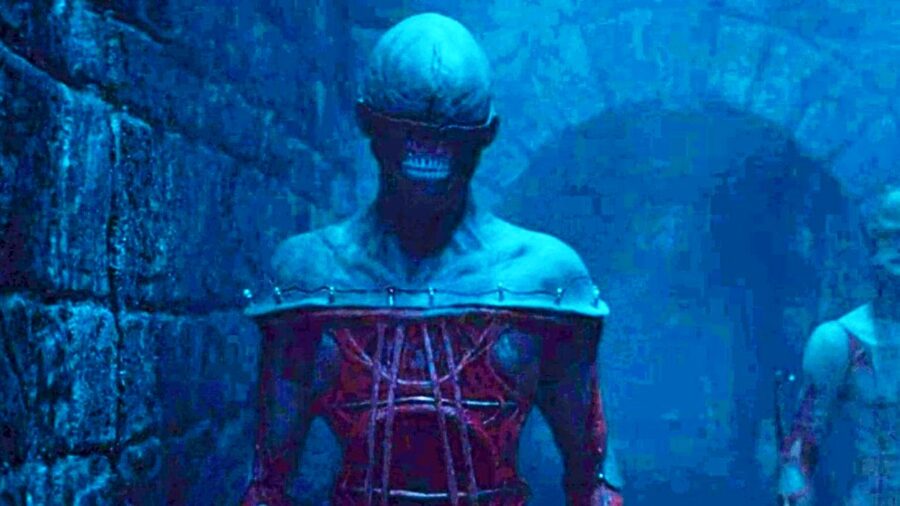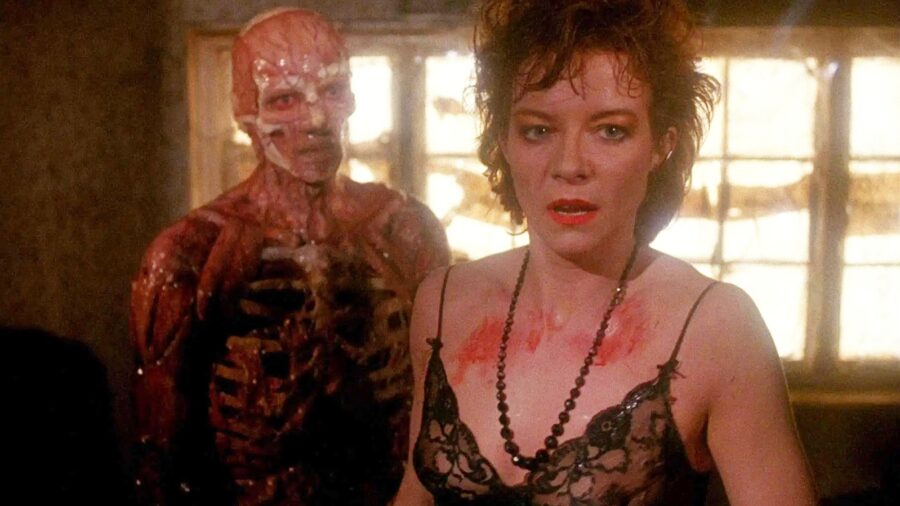Is The Hellraiser Reboot Sexy Enough?
The Hellraiser franchise started focused on amoral desire, but it has become just another good and evil story.
This article is more than 2 years old
The latest Hellraiser movie was recently released on Hulu to decently positive reviews and solid viewership, earning 67% Critics Score on Rotten Tomatoes and a place in the top ten most watched programs on the streaming service. In many ways, this 2022 reboot of Hellraiser is a return to form for the franchise, after years of diminishing returns and direct-to-DVD releases like Hellraiser: Hellworld and Revelations. But we ask: is this new, elevated horror version of Hellraiser sexy enough for the franchise?
That might seem an odd question at first, considering that the Hellraiser series is most famous for people being flayed alive and hideous interdimensional demons with chattering mouths. But at its core, Hellraiser is about the intersection of pleasure and pain and how an endless need to experience more can change people into something both less and more than human. However, it seems somewhere along the way, it has largely been forgotten that Hellraiser is not just about demons torturing humans.

The 2022 Hellraiser does not directly connect with the original film (or any of the sequels), but the series has the advantage of being able to start the narrative over again in any place and time in which someone is unlucky enough to find one of the puzzle boxes that inevitably summon the Cenobites. In this version, that person is Riley (Odessa A’zion), a recovering drug addict who inadvertently delivers her brother Matt (Brandon Flynn) to the Cenobites in a scene that is unmistakably coded as a relapse.
The rest of the film is essentially a treasure quest, in which Riley, her boyfriend Trevor (Drew Starkey), and various cannon-fodder characters try to figure out how to unlock the puzzle box and survive the Cenobites long enough to rescue Matt. This being the Hellraiser franchise, things do not work out so well for anyone, but that’s what you get for messing with interdimensional hell demons.

Except that in the original Clive Barker movie (and his novella The Hellbound Heart, which it was based on), the Cenobites and their leader Pinhead/Lead Cenobite/the Priest of the Order of the Gash are explicitly not demons, or at least not just demons. Barker has described the legendary New York City S&M club Cellblock 28 as an influence on his creations, with the idea of consensual torture and BDSM imagery being deep in the DNA of the franchise. As Doug Bradley’s original Pinhead memorably described his fellow Cenobites:
Explorers in the further regions of experience… Demons to some, angels to others.
The first Hellraiser movie was overtly about sexual desire. The antagonist was not the Cenobites, but a hedonistic human who becomes trapped in a world of sadomasochistic sensation that is more than he could have ever expected. The Cenobites themselves are essentially amoral, uninterested in concepts of good and evil, merely in the pursuit of sensation.

Over the course of the Hellraiser franchise, this focus on sex and sensation has slowly diminished, to the point where the Cenobites are ruled by an otherworldly, crystalline god named Leviathan and their home dimension is overtly referred to as Hell. However, the idea that there are scary demons who want to hurt you is far less interesting than unknowable beings whose existence has become so defined by their appetites that they have transcended good, evil, or anything but carnal sensations.
The 2022 Hellraiser does take the interesting step of substituting the idea of chemical addiction for sexual exploration, and it does allude to the origins of the franchise via a secondary villain (Goran Višnjić of Practical Magic, in which he also messed with dark magic to no good end) who has lost his humanity due to his craving for otherworldly sexual experiences. But this movie still treats Pinhead (now played by Jamie Clayton) and the other Cenobites as essentially malevolent beings, looking to trick humans into torture like humanoid monkey paws.
The real horror of Hellraiser is not the idea that demons use blood to feed their dark god or that they deliberately give humans “gifts” that turn out to be horrific punishments. Instead, it is that humans cannot know what they are asking for when they unlock the puzzle box and ask for a new, unlimited world of sexual sensations beyond any mortal understanding. Maybe, some Hellraiser movie might remember it is not about demons torturing humans, but humans not comprehending what they are asking for.










